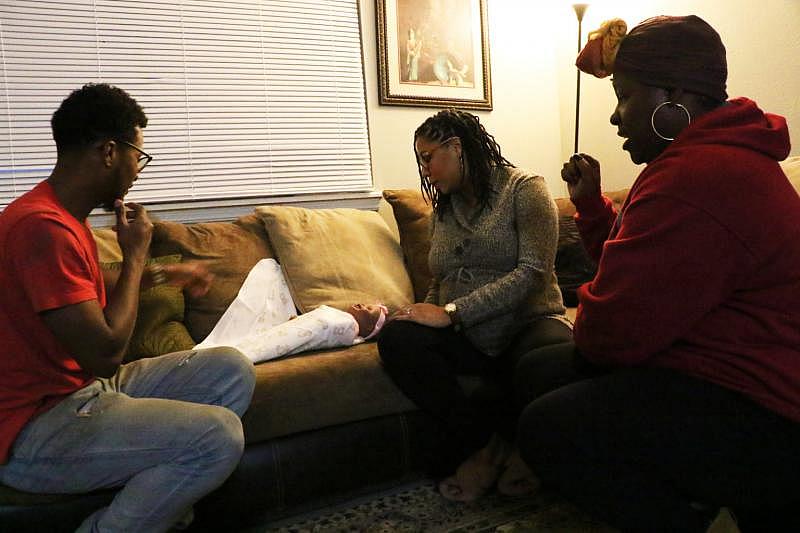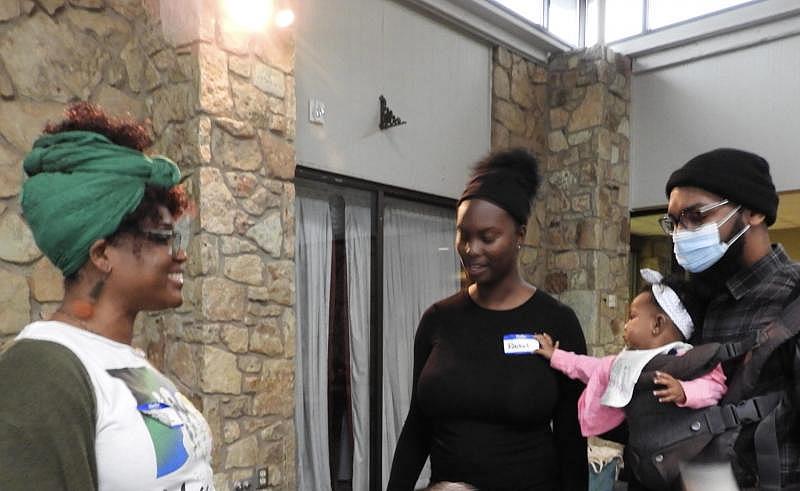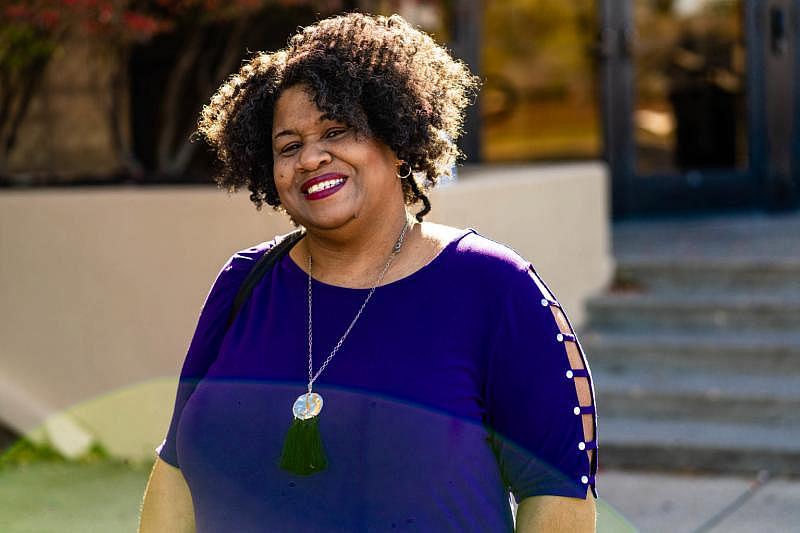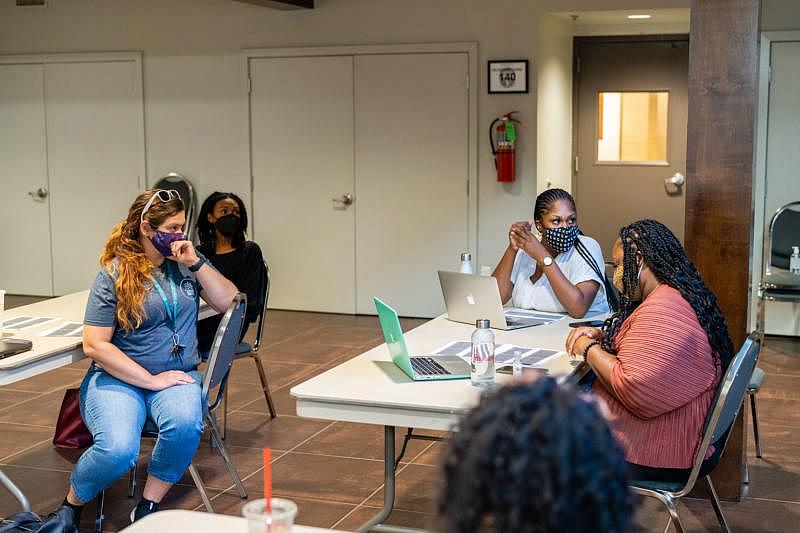In Oklahoma, Black families turn to doulas for better births
This story was reported as a project for the USC Annenberg Center for Health Journalism’s 2021 National Fellowship.
Other stories by Kassie McClung includes:
Video: Watch our panel discussion on ‘Racism and Reproductive health’

While progress to address poor birth outcomes among Black Oklahomans has been slow, women are taking action themselves.
The Frontier
Laughter filled the living room of Carmen and Daniel Gibson’s second-floor apartment in Tulsa as they practiced swaddling a baby doll, gently wrapping it in a white blanket.
Their doula, Ashlee Wilson, sat nearby and offered advice and words of encouragement.
“So, the first thing is, it doesn’t have to be perfect, right,” Wilson said as Daniel carefully crossed a corner of the blanket over the doll.
“A real baby will be moving around,” he said.
“Yeah, but look how swaddled she is,” Wilson said. “She looks so good and comfy. That’s a good fold.”
Wilson is a doula with the Tulsa Birth Equity Initiative, a new program of the George Kaiser Family Foundation that’s working to address maternal health disparities in the city.
She helped the couple make a birthing plan, taught them about labor positions and made herself a constant source of support.
Doulas are non-medical birth workers who provide emotional, educational and physical support during pregnancy and postpartum. They can also advocate on the behalf of women during labor and delivery.
Carmen describes herself as a researcher and knows that Black women are more likely to experience pregnancy-related complications than white women. The numbers troubled her, but she didn’t want them to overshadow the joy of her pregnancy. So she sought encouragement and support from a doula.
“When you talk to other people, they always tell you everything negative about birth,” she said. “So a good thing about Ashlee is she brings you to look at it in a positive way.”
Daniel and Carmen Gibson practice swaddling a baby doll with help from their doula, Ashlee Wilson (right). KASSIE McCLUNG/The Frontier
While the reasons for disparities are complex, Black Oklahomans are turning to doulas as a way to combat the disproportionately high rates of adverse health outcomes among Black Americans.
Oklahoma reported the fourth-highest rate of maternal mortality in the country in 2018, and Black women die of pregnancy-related complications at a rate more than 60 percent higher than that of white Oklahomans. The crisis is closely tied to infant mortality. Black infants in Oklahoma are more than twice as likely as white infants to die before their first birthday.
Black women also disproportionately suffer life-threatening complications of pregnancy and childbirth. They were almost twice as likely as white women to have complications that involved hypertension and blood transfusions from 2017 to 2019, according to state health data.
Research shows that patients with continuous labor support were less likely to have C-sections or use pain medications. Those who delivered babies with doulas also experienced fewer labor complications and were less likely to have babies with low birth weights, researchers have found.
Medicaid programs in at least four states — Oregon, Minnesota, New Jersey and Florida — already cover doula services, and many states have passed legislation to offer Medicaid reimbursements for services or launched pilot programs in recent years.
At least 20 states introduced legislation related to the issue in 2021, according to the National Health Law Program. But Oklahoma lawmakers haven’t authored similar bills, and the state has just begun to take preliminary steps to expand access to doula services, despite higher death rates among Black mothers in the state.
Doula fees can range from around $600 to $1,500 in Oklahoma, a price point that’s out of reach for many low-income people in the state. SoonerCare, Oklahoma’s Medicaid program, pays for more than 57 percent of the births in the state, but doesn’t cover doula services.
Almost 70 percent of the women who died between 2009 and 2017 were covered by Medicaid, according to the state’s Maternal Mortality Review committee.
The Oklahoma Health Care Authority, which oversees the state’s Medicaid program, recently started internal discussions to explore doula service coverage in the state, an agency spokeswoman said.
The state Health Department’s Maternal Mortality Review Committee investigates maternal deaths and issues guidance to policy makers and health care providers to improve outcomes. But unlike similar boards in other states, it hasn’t yet made specific recommendations to address what it has called an “alarming disparity” in birth outcomes for Black Oklahomans.
Committee members told The Frontier that some of the recommendations target racial disparities, though they aren’t specified as such in the board’s reports. The committee also hasn’t yet recommended funding doula programs for low-income Oklahomans.
Review committees in at least 18 states, including Texas, Kansas and Missouri, have issued targeted guidance to address racial disparities. Texas’ maternal mortality review committee, for example, has recommended programming such as forming a subcommittee to analyze factors that cause disparities. The subcommittee was formed in 2018.
The Texas review committee has also suggested stakeholders, such as state agencies and hospital systems, enlist Black women to help plan and develop maternal health initiatives.
The Oklahoma State Department of Health did create a Maternal Health Task Force last year to study maternal mortality and improve outcomes. One of the group’s priorities is to address long-standing racial disparities. The task force is monitoring community-based doula groups to see how the state can expand on the programs and assist with efforts.
Black Oklahomans died at higher rates
Black Oklahomans face deep-rooted health disparities.
Even as the maternal mortality rate for Black women dropped in 2019 to 40.8 deaths per 100,000 live births in Oklahoma, it still remains much higher than the overall state rate of 23.5 deaths, according to the Oklahoma Maternal Mortality Review committee’s latest report.
Additionally, the report found that although Black women were less likely to report being screened for postpartum depression than any other group, they were the most likely to report symptoms of depression when they were screened.
Oklahoma had the second-highest uninsured rate in the nation in 2019, behind Texas, according to the committee’s latest report. Medicaid expansion in Oklahoma took effect in July, allowing more people to obtain coverage.
In 2017, 21.4 percent of Black Oklahomans reported being uninsured prior to pregnancy compared to 18.3 percent of white mothers.
The state surveyed women aged 18 to 44 in 2019, and almost a quarter of the participants reported they felt a trip to the doctor was too expensive to attend, according to the state’s report.
//Though poverty exacerbates the issue, research has shown that Black women are more likely to face adverse pregnancy outcomes regardless of income or education level.
Some researchers have found racism contributes to worse health outcomes for Black Americans and the idea is gaining acceptance in mainstream epidemiology.
Arline Geronimus proposed that the health of Black mothers deteriorated prematurely because of constant stress caused by racism. Geronimus coined the phrase “weathering” more than 30 years ago as a researcher at the University of Michigan in Ann Arbor studying disparities in mortality rates among Black infants.
The issues begin with the systemic injustice Geronimus studied, such as a lack of access to nutritious food and unsafe housing. Black Americans are more likely to have chronic conditions such as diabetes, obesity and hypertension.
Farah Antoine-Mayberry and other birth workers of color believe that maternal and infant health disparities could be reduced if there were more of them in the field.
Antoine-Mayberry is an Oklahoma City-based doula, lactation consultant and founder of For the Village, a nonprofit launched in late 2020 that’s working to improve the maternal and infant health outcomes of Black Oklahomans through doula, lactation and education services.
A mother of five, Antoine-Mayberry has worked in hospitals as an occupational therapist for almost 20 years. When her youngest was born, she started to facilitate a breastfeeding support group. She threw herself into doula work in 2018 after she recognized there was a need for education around childbirth.
Then she made a startling discovery: Among developed countries, the United States has one of the highest rates of maternal and infant mortality, and the problem is worse for Black families.
“That was hard information to absorb,” she said.
One of the organization's goals is to increase the number of Black birth workers in Oklahoma. For the Village trains five doulas every year, who then provide free services to Black families.
Researchers have started to examine whether receiving care from a physician of the same gender or race as a patient can improve health outcomes. A study released in 2020 suggested that the difference between mortality rates for Black and white newborns was cut by half when Black infants received care from Black doctors.
Antoine-Mayberry said she has observed how bias exists against her Black doula clients. She educates her clients to be aware of biases that lead to hospital workers expecting them to formula feed instead of breastfeed. Research shows that hospitals in communities with larger Black populations are less likely to help initiate breastfeeding after birth.
“I’m more likely to hear from Black patients that formula is needed than I am for my white doula clients,” she said. “This to me is a reflection of the biases that exist and not exclusively because of the circumstances of those cases.”
For the Village Executive Director Farah Antoine-Mayberry, left, talks with parents Rachel and Scott Nelson with daughter Gianna, 6 months, at an outreach event in Oklahoma City. BRIANNA BAILEY/The Frontier
Bias against Black mothers from health care providers in Oklahoma is well documented.
A 2009 study from the Oklahoma State Department of Health found that prenatal health care workers were more likely to give Black women guidance on illegal drug use and physical abuse, and less likely to give information on the appropriate amount of weight to gain during pregnancy when compared to white women.
In 2015, the state Health Department released a study that found even though Black women had a much lower rate of smoking or drinking before pregnancy than white women, they were still the most at risk for infant and maternal mortality.
The study recommended the state identify and address systemic racism within the policies of agencies, programs and health systems.
Structural racism, access to quality health care, implicit bias and chronic health conditions all play a role in disparities in birth outcomes, said Dr. Syeachia Dennis, a family physician and an assistant dean at the University of Oklahoma-University of Tulsa School of Community Medicine. In recent years, Dennis has seen a movement in the medical education field to recognize that racism must explicitly be named as a social and structural determinant of health.
“We have to dismantle all the structures that uphold racism that are keeping Black people, Indigenous people from having the same opportunity to just live,” Dennis said.
Maternal mortality in Oklahoma
On average, one Oklahoman dies from pregnancy-related complications each month.
The most frequent causes of maternal death in Oklahoma include heart conditions, sepsis, diabetes and hemorrhage, according to the Maternal Mortality Review committee's 2021 annual report.
In 2019, committee members started to analyze whether maternal deaths could have been prevented and reviewed 34 of the most recent deaths. Of those cases, almost 71 percent were found to have a “good chance” or “some chance” of being prevented, according to the committee’s report.
The pandemic slowed efforts to review deaths, and the committee finished reviewing cases from 2018 in October, said Jill Nobles-Botkin, an advanced practice registered nurse who oversees the committee.
In July, committee members started to review cases to try to determine whether racism or implicit bias played a role in deaths. So far they haven’t identified any, Nobles-Botkin said.
“We’ve talked about the possibility that it could be there, but we haven't been able to definitely define that as a contributing factor,” she said.
The board examines medical records, and sometimes law enforcement records, court documents and media reports when reviewing cases. But it’s difficult to determine whether racism or implicit bias contributed to a death by looking at those records alone, said Joyce Marshall, a committee member and director of Maternal and Child Health Service at the Oklahoma State Department of Health.
The committee’s recommendations don’t explicitly address racial disparities because they haven’t yet established that race was a factor in the deaths it has reviewed, Nobles-Botkin said.
However, some of the recommendations are connected to racial disparities, committee members said. These include increasing awareness on the importance of preconception health care; educating women and families on postpartum warning signs and attending postpartum visits; and promoting the national Hear Her campaign, which aims to increase awareness of maternal mortality and women’s health following childbirth.
The health department also started offering online “racial disparity” training this year to maternal health providers, which includes teachings on how disparities affect health outcomes and how to recognize implicit and explicit biases. The first month it was offered, 175 providers signed up, Marshall said. The agency has plans to expand the training and will eventually offer in-person classes.
‘It can save lives’
While progress to address poor birth outcomes among Black mothers has been slow, women are taking action themselves.
Rose Hurd, 57, has offered support to families in the Tulsa community for more than 40 years and became a certified doula in 2016. She’s helped countless women through pregnancies, including her children. Hurd has also helped mentor other birth workers in the area.
She’s seen health care workers fail to listen Black women or not involve them in decisions about their own pregnancies. Her goal is to empower families, act as an advocate and offer techniques, such as lactation support, that can lead to better health outcomes.
Rose Hurd has helped mentor other doulas in Tulsa. CHRISTOPHER CREESE/For The Frontier
Doulas are also a crucial source of support after babies arrive, when families might need help with safe sleep practices or postpartum depression, Hurd said.
She would like to see Medicaid coverage of doula care in Oklahoma, even if only for basic services and postpartum care.
“It can save lives,” Hurd said.
Multiple independent efforts to train more Black birth workers are underway in Oklahoma.
On a hot August evening in a classroom in downtown Tulsa, LaKala Williams joined a group of other doulas in training to learn about different types of medical interventions during labor.
Three students role-played a birth scenario wherein a dismissive nurse told the mother she needed to immediately decide whether she wanted doctors to induce labor. It was up to the doula to advocate for the mother to give her more time to decide and weigh her options.
LaKala Williams (second to right), attends a class with the Tulsa Birth Equity Initiative in August 2021. CHRISTOPHER CREESE/For The Frontier
Williams, 22, is a doula with the Tulsa Birth Equity Initiative, which provides free doula services to Black, Indigenous and teen Oklahomans, as well as those involved in the criminal justice system.
The organization trains and then pairs community-based doulas with families. During pregnancy, doulas meet with clients once per week to build relationships, make pregnancy goals and craft birthing plans. Doulas stay with mothers for the birth and stay in touch with the family at least three months postpartum. There’s no income requirement to qualify for the program.
Williams, who grew up in north Tulsa, has seen Black mothers in her community struggle with postpartum depression and breastfeeding. She wonders if they could have benefited from having help from doulas.
“I just think it’s really important to be heard and to be seen in this world,” she said. “And I think a lot of times women of color and people of color are put on the back burner, and they’re not heard and they’re not seen, especially in the health world.”
The program emphasizes forming meaningful relationships between doulas and clients, said LaBrisa Williams, the executive director of the initiative.
“The doulas don't just work with the immediate family, and mom and dad,” she said. “They know cousins and aunts, and they know the ins and outs of people’s families.”
Earlier this year, as a doula in-training, LaKala Williams massaged her pregnant sister’s aching back, practiced positive affirmations and had her sit on a birthing ball. She and another doula practiced the techniques at her sister’s home in Tulsa until it was time to deliver the baby at a hospital.
Later, through a cell phone screen, LaKala Williams beamed with pride as she watched her sister cradle a healthy baby boy in the delivery room.
“Seeing her cry after seeing her hold her baby — that is life changing,” she said.
This project received support from the USC Annenberg Center for Health Journalism’s 2021 National Fellowship.
[This story was originally published by The Frontier.]

